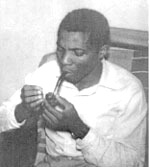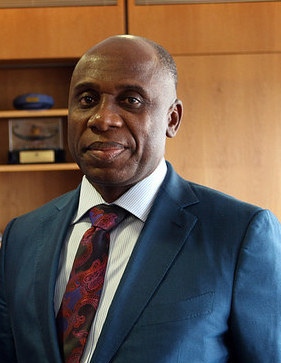
Akinwande Oluwole Babatunde Soyinka Hon. FRSL, known as Wole Soyinka, is a Nigerian playwright, novelist, poet, and essayist in the English language. He was awarded the 1986 Nobel Prize in Literature for his "wide cultural perspective and... poetic overtones fashioning the drama of existence", the first sub-Saharan African to be honoured in that category.

Port Harcourt is the capital and largest city of Rivers State in Nigeria. It is the fifth most populous city in Nigeria after Lagos, Kano, Ibadan and Benin. It lies along the Bonny River and is located in the oil rich Niger Delta. As of 2023, Port Harcourt's urban population is estimated at 3,480,000. The population of the metropolitan area of Port Harcourt is almost twice its urban area population with a 2015 United Nations estimate of 2,344,000. In 1950, the population of Port Harcourt was 59,752. Port Harcourt has grown by 150,844 since 2015, which represents a 4.99% annual change.

Christopher Ifekandu Okigbo was a Nigerian poet, teacher, and librarian, who died fighting for the independence of Biafra. He is today widely acknowledged as an outstanding postcolonial English-language African poet and one of the major modernist writers of the 20th century.
Gabriel Imomotimi Okara was a Nigerian poet and novelist who was born in Bumoundi in Yenagoa, Bayelsa State, Nigeria. The first modernist poet of Anglophone Africa, he is best known for his early experimental novel, The Voice (1964), and his award-winning poetry, published in The Fisherman's Invocation (1978) and The Dreamer, His Vision (2005). In both his poems and his prose, Okara drew on African thought, religion, folklore and imagery, and he has been called "the Nigerian Negritudist". According to Brenda Marie Osbey, editor of his Collected Poems, "It is with publication of Gabriel Okara's first poem that Nigerian literature in English and modern African poetry in this language can be said truly to have begun."

The World Book Capital (WBC) is an initiative of UNESCO which recognises cities for promoting books and fostering reading for a year starting on April 23, World Book and Copyright Day. Cities designated as UNESCO World Book Capital carry out activities with the aim of encouraging a culture of reading in all ages and sharing UNESCO's values. The nomination does not provide a financial prize.
African literature is literature from Africa, either oral ("orature") or written in African and Afro-Asiatic languages. Examples of pre-colonial African literature can be traced back to at least the fourth century AD. The best-known is the Kebra Negast, or "Book of Kings."
Elechi Amadi was a Nigerian author and soldier. He was a former member of the Nigerian Armed Forces. He was an author of plays and novels that are generally about African village life, customs, beliefs, and religious practices prior to contact with the Western world. Amadi is best regarded for his 1966 debut novel, The Concubine, which has been called "an outstanding work of pure fiction".

Chibuike Rotimi Amaechi is a Nigerian politician, he served as the Federal Minister of Transportation of Nigeria from 2015 to 2022 under the cabinet of President Muhammadu Buhari. He resigned to contest for Nigeria's presidency under the ruling All Progressive Congress (APC). He previously served as Governor of oil-rich Rivers State from 2007 to 2015 and speaker of the Rivers State House of Assembly from 1999 to 2007. On 9 April 2022, Amaechi declared his interest to contest in the presidential election in 2023, he came second in the APC presidential primaries held in June 2022 behind eventually winner Bola Tinubu with 316 votes from the delegates.

The Ikwerre are an indigenous Igbo tribe in Rivers State, Nigeria. The Ikwerre ethnic group in Rivers State, spans over four Local Government Areas; Port Harcourt, Obio Akpor, Ikwerre, and Emohua.. Pockets of the Ikwerre are found in nearby Ohaji-Egbema LGA of Imo State.

Government College Umuahia, or GCU, is an independent secondary school for boys located on Umuahia-Ikot Ekpene road in Umuahia, Nigeria.
Captain Elechi Amadi Polytechnic is a Polytechnic funded by the Government of Rivers State, located in Port Harcourt, Rivers State, Nigeria.
Wole Soyinka Prize for Literature in Africa is a pan-African writing prize awarded biennially to the best literary work produced by an African. It was established by the Lumina Foundation in 2005 in honour of Africa's first Nobel Laureate in Literature, Wole Soyinka, who presents the prize, which is chosen by an international jury of literary figures. Administered by the Lumina Foundation, the prize has been described as "the African equivalent of the Nobel Prize".
Africa39 was a collaborative project initiated by the Hay Festival in partnership with Rainbow Book Club, celebrating Port Harcourt: UNESCO World Book Capital 2014 by identifying 39 of the most promising writers under the age of 40 with the potential and talent to define trends in the development of literature from Africa and the African diaspora. Launched in 2014, Africa39 followed the success of two previous Hay Festival initiatives linked to World Book Capital cities, Bogotá39 (2007) and Beirut39 (2009).

This is a timeline of the history of Port Harcourt, the capital of Rivers State, Nigeria.
Ukamaka Evelyn Olisakwe is a Nigerian feminist author, short-story writer, and screenwriter. In 2014 she was chosen as one of 39 of Sub-Saharan Africa's most promising writers under the age of 40, showcased in the Africa39 project and included in the anthology Africa39: New Writing from Africa South of the Sahara.
The Mbari Club was a centre for cultural activity by African writers, artists and musicians that was founded in Ibadan, Nigeria, in 1961 by Ulli Beier, with the involvement of a group of young writers including Wole Soyinka and Chinua Achebe. Mbari, an Igbo concept related to "creation", was suggested as the name by Achebe. Among other Mbari members were Christopher Okigbo, J. P. Clark and South African writer Ezekiel Mphahlele, Frances Ademola, Demas Nwoko, Mabel Segun, Uche Okeke, Arthur Nortje and Bruce Onobrakpeya.
Chinua Achebe Literary Festival is an annual literary event held in honour of Nigerian writer and literary critic — Chinua Achebe, the author of Things Fall Apart (1958), in commemoration and celebration of his works and immense contributions in the literary field.

Ossie Enekwe, born Onuora Osmond Enekwechi, was a Nigerian dramatist, poet, novelist, and professor of Theatre Arts. A former vice president of the Association of Nigerian Authors (ANA) as well as the former director of the Institute of African Studies at the University of Nigeria, Nsukka (1998–2004). He helped to establish the University of Nigeria's Dramatic Arts Department. Enekwe was the editor of Okike: The African Journal of New Writing from 1984 to 2010, after being appointed by its founder, Chinua Achebe, who founded it in 1971. When Ossie Enekwe retired in 2010, he handed over the editorship of Okike to Amechi Akwanya.
Mpalive-Hangson Msiska is a Malawian academic resident in London, England. He is a Reader Emeritus in English and Humanities at Birkbeck College, University of London, with research and teaching interests in critical and cultural theory as well as postcolonial literature, including African literature, Wole Soyinka and Chinua Achebe being notable subjects of his writing.









